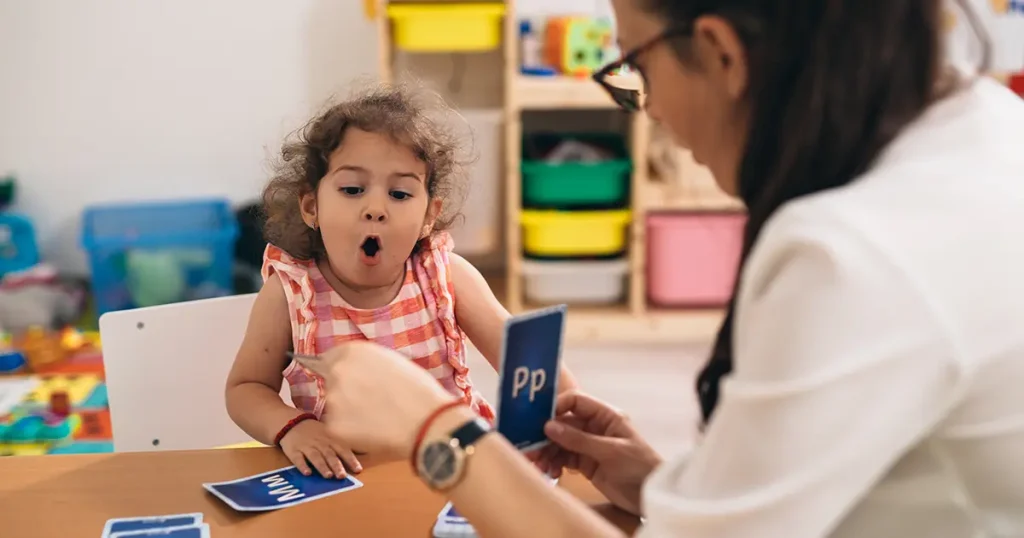Children develop communication skills at different paces, but significant delays in speaking or interacting socially may signal a need for support. Language delays affect how a child understands or uses words, while social delays impact their ability to engage, take turns in conversation, or respond to social cues. Recognizing these delays early allows caregivers and educators to seek appropriate interventions. These challenges can affect academic performance and peer relationships if left unaddressed, making early identification important.
What is Speech Therapy and How Does It Work?
Speech therapy is a structured, evidence-based intervention designed to improve communication and social interaction skills. Conducted by certified speech-language pathologists, therapy sessions may include games, storytelling, articulation exercises, and role-playing, tailored to each child’s developmental needs. The therapy not only focuses on pronunciation but also includes language comprehension, vocabulary building, and non-verbal communication strategies. Each session builds upon previous progress, offering a gradual and effective path toward better communication.
Common Signs That a Child May Need Speech Therapy
Every child develops at their own pace, but some things shouldn’t be overlooked. Speech therapy may be beneficial if a child:
- Says only a few words by age two
- Has trouble forming complete sentences beyond age three
- Avoids eye contact or struggles with group play
- Can’t follow simple instructions
- Is difficult for others (outside family) to understand
Role of Speech-language Pathologists (SLPs)
SLPs play a key role in assessing and addressing both language and social communication delays. They begin with a detailed evaluation that includes observing the child, interviewing caregivers, and using standardized tools. Based on their findings, they develop a customized treatment plan. In therapy, SLPs use age-appropriate strategies and often collaborate with teachers, occupational therapists, and parents to ensure consistent support across environments. Their training allows them to tailor techniques to the child’s individual needs, making the sessions highly impactful.
Mumbai stands out for its multidisciplinary pediatric care and widespread availability of qualified speech therapists. The city has advanced therapy centers and hospitals that offer customized intervention plans backed by the latest research. Parents seeking personalized, results-driven care often find the best speech therapist in Mumbai within reach, thanks to the city’s strong network of experienced professionals.
How Speech Therapy Supports Language Development
One of the main goals of speech therapy is to build the foundation for language comprehension and usage. Children are guided to improve their understanding of words, sentence structure, and concepts like time, space, and categories. Visual aids, interactive games, and repetition techniques are commonly used. As their vocabulary grows, children become more confident expressing themselves. With improved language skills, their ability to narrate experiences, ask questions, and share ideas also grows.
Boosting Social Interaction Through Communication Skills
Speech therapy also addresses the social aspect of communication. This includes teaching children how to initiate and maintain conversations, interpret facial expressions, and understand others’ perspectives. For kids with conditions like autism or selective mutism, this aspect of therapy is especially valuable. Therapists may use group settings, role-play, or video modeling to enhance peer interaction skills. These milestones help children form friendships and navigate everyday social situations more comfortably.
Early Intervention and Its Long-term Impact
Early intervention is often the difference between a short-term delay and a lifelong challenge. When therapy begins before age five, the brain’s plasticity makes it more responsive to change, allowing children to catch up with their peers more easily. Studies show that early therapy can lead to better school readiness, emotional regulation, and stronger self-esteem. The sooner a delay is addressed, the less likely it is to interfere with other developmental milestones.
Therapy Techniques Used in Language and Social Skill Building
SLPs use a variety of techniques, depending on the child’s age, ability, and goals. These can include:
- Articulation therapy for pronunciation issues
- Picture Exchange Communication System (PECS) for non-verbal children
- Social stories to teach context-specific behavior
- Language modeling and expansion
- Interactive storytelling for narrative skills







